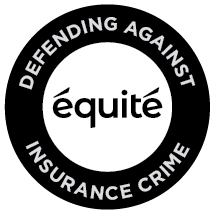Most of us have personal information scattered across the Internet and with each new app, device and piece of technology, cyber criminals have a new opportunity to take advantage.
Identity thieves commonly use your name, date of birth, address, credit card number, Social Insurance Number (SIN) and other personal details to commit fraud. They can apply for credit cards and loans, redirect mail, sign up for cell phones, rent vehicles, buy and receive merchandise and even get a job. There are so many reasons to be vigilant about identity theft.
How do you know if you’re a victim of identity theft?
Keep track of where you share information. If you receive credit card statements or bills in your name that you didn’t apply for, question it. If you receive letters or calls regarding credit accounts approved or denied by creditors you’ve never contacted, or calls from collection agencies about defaulted accounts, investigate it immediately. Learn more about the warning signs of fraud.
If your identity is stolen, follow these steps:
- Report the crime to the police immediately and ask for a copy of the police report as proof of the theft for any organization you need to contact.
- Ask your bank or financial institution and credit card company to place a notice on your accounts.
- Contact Equifax Canada or TransUnion Canada to place a fraud alert on your credit reports.
- Report the theft and fraud to the Canadian Anti-Fraud Centre.
- Contact Canada Post if you suspect that someone’s diverting your mail.
- Advise your phone company, cable provider and any other utilities that someone using your name could try to open new accounts fraudulently.
All Co-operators home, condominium, tenant, residential and seasonal insurance policies include Identity fraud recovery expense at no extra cost. If your identity’s stolen, we’ll reimburse you up to $10,000 – $25,000 for Prestige Plus Homeowners clients – for expenses including legal fees, the cost of notarizing affidavits and earnings lost due to time away from work.
*If we provide coverage for multiple residences, the insured has the benefit of a $10,000 Identity fraud recovery expense limit from each property. If two people insured under the same policy are victims of identity fraud in the same occurrence, they will have coverage for $10,000. If each insured experiences identity fraud in separate occurrences, a $10,000 coverage limit will apply to each occurrence.
Reduce your risk of identity theft
Follow these cyber security tips and manage your personal information wisely:
- Be careful when using credit cards. Limit the number of credit cards you carry around and cancel ones you don’t use.
- Report lost or stolen credit cards and unfamiliar charges on your bill right away.
- Never leave receipts at bank machines or in trash cans.
- Shred or securely store financial statements and personal documents you don’t need and destroy pre-approved credit applications.
- Don’t give out personal information on the phone, by mail or over the Internet unless you have initiated the contact or know who you're dealing with.
- Clear out your mailbox right away and destroy receipts, copies of credit applications, insurance forms, physician statements and credit offers.
- Pay attention to your billing cycles. Follow up with creditors if your bills don't arrive on time, or switch to online billing for a more secure and sustainable option.
- Don’t keep your birth certificate, passport or SIN card in your wallet.
- Memorize and regularly change your PINs and computer passwords. Don’t write them down or use obvious information, like your birth date.
- Take advantage of technology that enhances security and privacy when using the Internet, like digital signatures, data encryption and anonymizing services.
- Make sure your debit card is swiped only once in the proper card reader and shield the keypad when entering your PIN.
- Check your credit score from a credit reporting agency once a year to ensure it is accurate and doesn't include debts or activities you haven't authorized.
Start taking steps toward online safety today to prevent identity theft tomorrow.

 Home
Home
 Auto
Auto